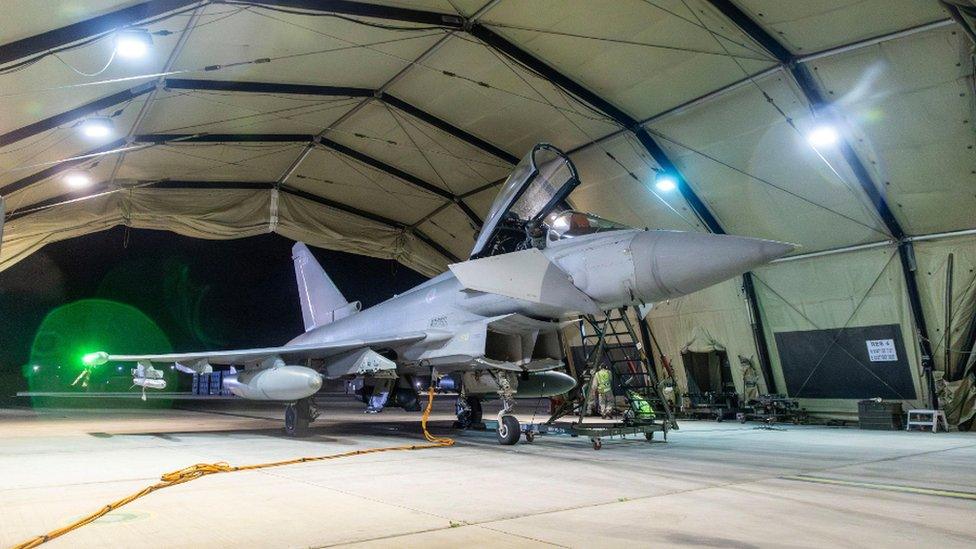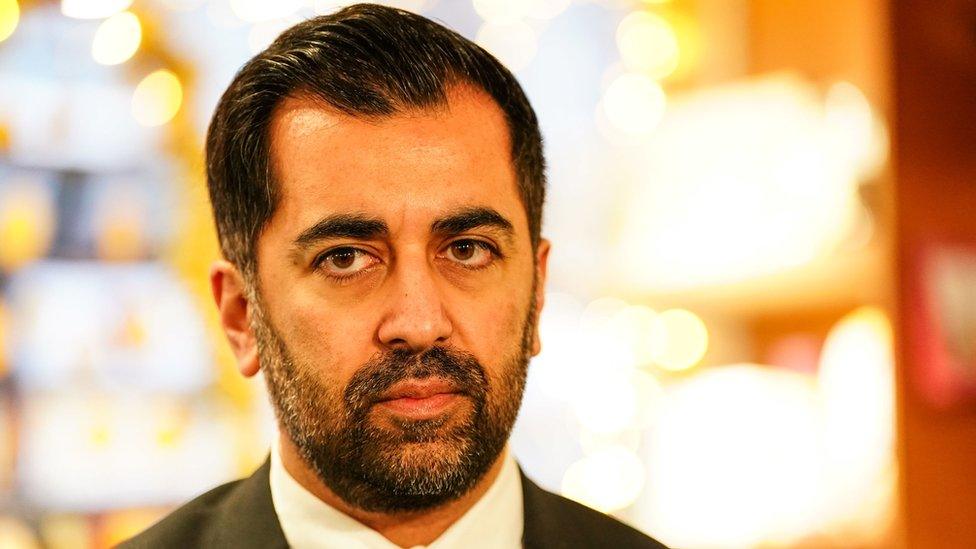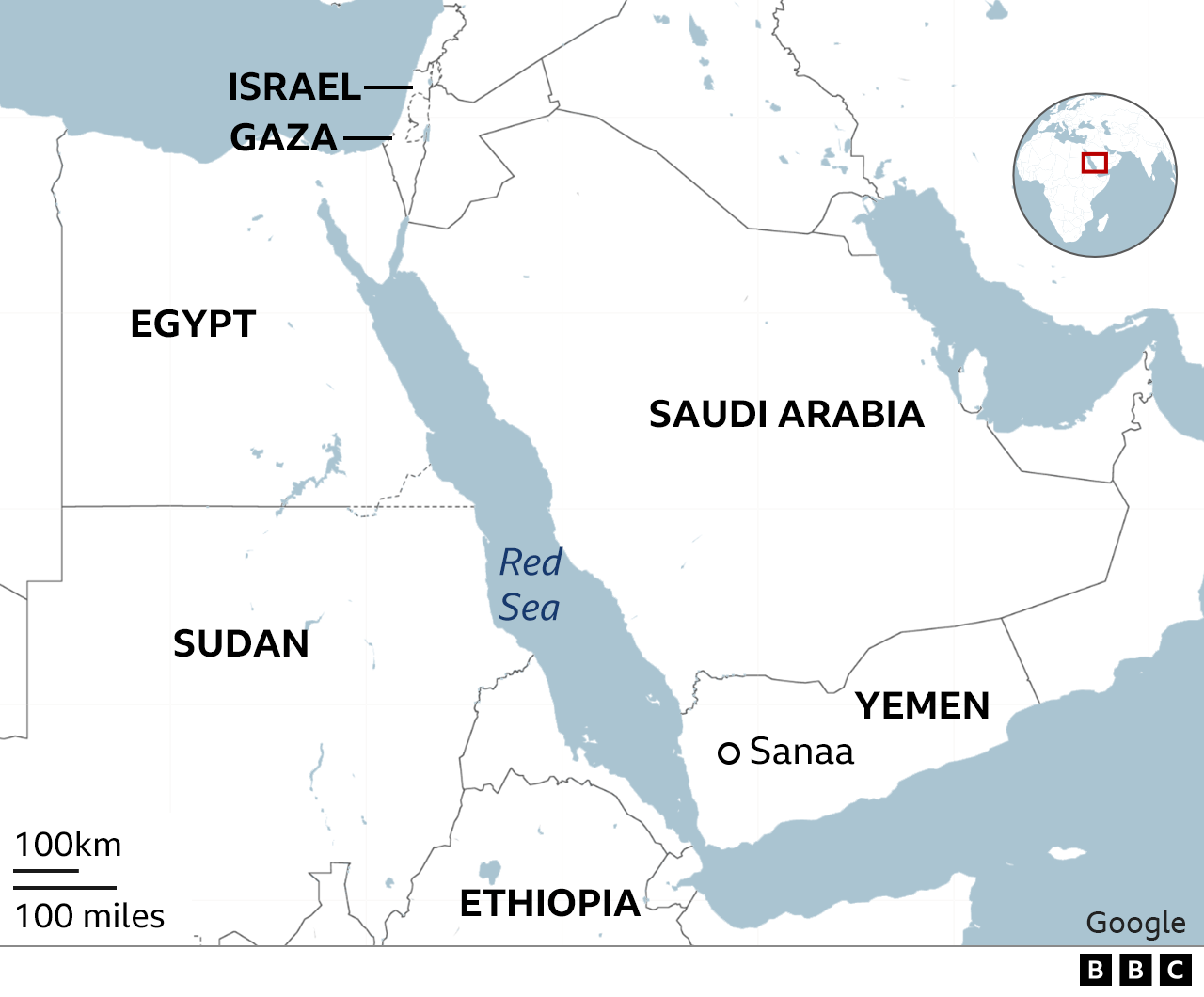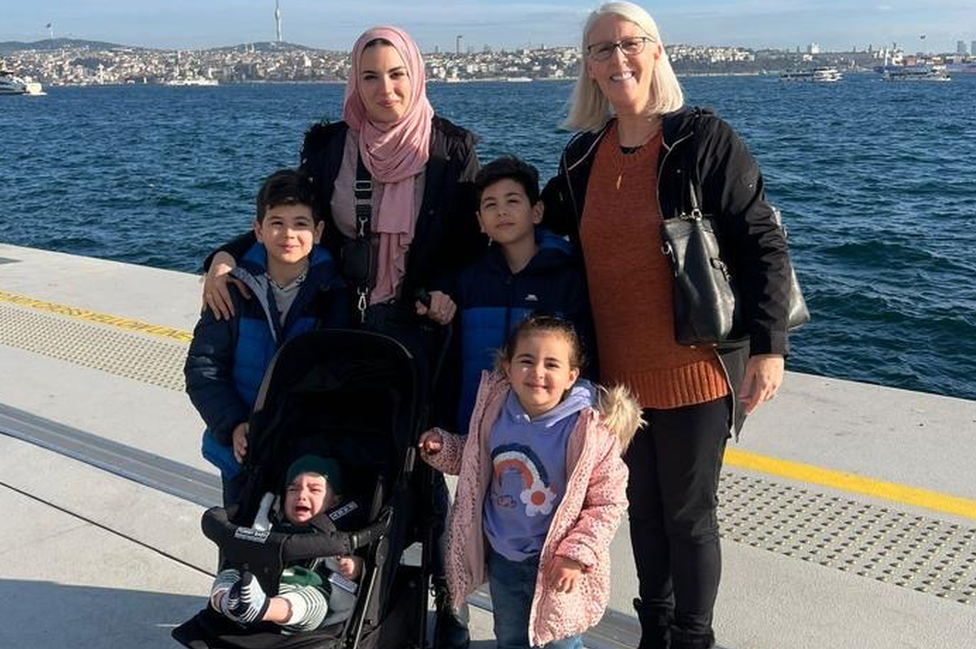FM calls for UK parliament recall over Yemen air strikes
- Published

One of four RAF Typhoon aircraft returning to RAF Akrotiri in Cyprus after joining the US-led coalition conducting air strikes against military targets in Yemen
Scotland's first minister Humza Yousaf has called for the UK parliament to be recalled over the air strikes in Yemen.
The UK and US strikes against Houthi rebel sites have been described by Rishi Sunak as "necessary and proportionate" to protect the global shipping in the Red Sea.
The targeted strikes on military facilities took place overnight.
Humza Yousaf said there were "significant questions" to be asked and answered about military action.
He told BBC Radio's Good Morning Scotland programme: "Let there be no equivocation that the SNP align ourselves with the UN security resolution, which is essentially calling for the Houthi rebels to stop their attacks in the Red Sea.
"But of course the UK's record on military intervention, particularly in the Middle East, is not a good one.
"Before action was taken, the correct and appropriate thing to have done would have been to have recalled parliament, who have given serious detail about any proposed military action."
He added: "There are significant questions around the action taken. What is the end goal? What will be deemed as a success?"

Mr Yousaf said he UK's record on military intervention was "not a good one"
Prime Minister Rishi Sunak has said the strikes against the Iranian-backed group, who he accuses of threatening UK ships, was in "self-defence".
In response, Houthi officials have warned that the UK and US will "pay a heavy price".
The US-led strikes are the first against the Houthi militia since it started targeting international shipping in the Red Sea last year.
The Houthis control much of Yemen and say they are supporting Hamas by targeting ships heading to Israel.
More than 60 targets at 16 locations used by the Houthi rebels in Yemen were struck, the US Air Force said.

Mr Sunak accused the Houthi rebels of threatening UK and international ships and causing major disruption to the trade route.
"Despite the repeated warnings from the international community, the Houthis have continued to carry out attacks in the Red Sea, including against UK and US warships just this week, " the prime minister said.
"This cannot stand. The United Kingdom will always stand up for freedom of navigation and the free flow of trade."
The Ministry of Defence (MoD) said Royal Air Force typhoons conducted two precision strikes on Houthi sites, including an airfield used to launch drones and missiles over the Red Sea and another site used to launch attack drones.
Responding to the attacks, a Houthi leader warned the US and UK will "soon realise" that the strikes on Yemen were "the greatest folly in their history".
The group maintains they will continue attacking ships in the Red Sea heading to or associated with Israel.

Ms El-Nakla's mother, Elizabeth (right), pictured with her daughter-in-law Doaa and her four grandchildren
Meanwhile, Mr Yousaf's wife, Nadia El-Nakla, has confirmed her sister-in-law and her four children had escaped Gaza.
Her brother is a doctor at Al-Nassar Hospital. He is still in the territory with other relatives.
Ms El-Nakla's parents returned to Scotland in November after being trapped in Gaza for four weeks when the war with Israel broke out during a family visit.
In a statement she said: "I'm pleased that my sister-in-law, Doaa, and their four children have escaped from Gaza, and are now safe.
"However, my brother Mohamed remains there along with my 93-year-old grandmother and many wider family members."
Ms El Nakla, who is a Dundee councillor, said families in Gaza were "still suffering after the loss of entirely innocent men, women and children".
She urged the UK government to launch a resettlement scheme for Palestinians, similar to the Ukraine Family Scheme visa.
She added: "I will continue to raise my voice to stop the killing and suffering of the innocent people of Gaza, and call for an immediate and urgent ceasefire."
A UK government spokesperson said: "Over 300 British nationals and their dependants have so far left Gaza, and we are working around the clock to get the rest of those out who want to leave.
"We have a team on the ground in Cairo and at the Rafah crossing as required to provide consular assistance.
"Any dependants of British citizens who need a visa can apply for one.
More than 23,350 people - mostly women and children - have been killed, according to the Hamas-run health ministry.
During the initial Hamas attacks on Israel some 1,300 people were killed - mainly civilians - and about 240 others taken hostage.